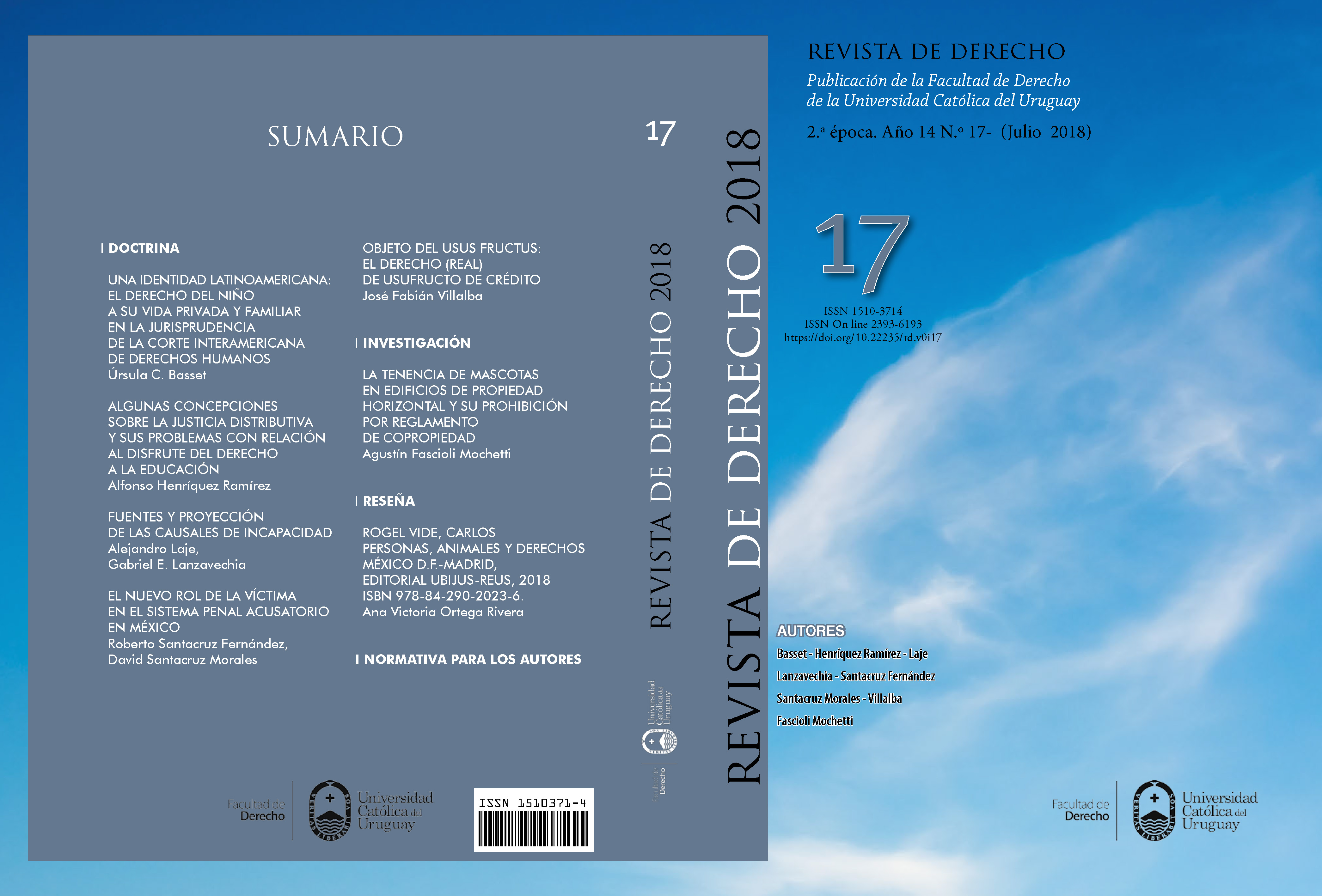Some conceptions about distributive justice and its problems in relation to the enjoyment of the right to education
DOI:
https://doi.org/10.22235/rd.v0i17.1528Keywords:
education, justice, distibutive justice, right to educationAbstract
In terms of distributive justice, one of the most important problems is that which relates to the question about which is the fairest distribution criterion. In this sense, three alternatives have been proposed: sufficiency, priority and egalitarianism. For sufficiency, justice lies in providing a sufficient or adequate level of wellbeing for all. In turn, for prioritarism, the State must prioritize only those who are worse off. Finally, for egalitarianism, justice consists in distributing the same or equal portion to everyone. In this paper, we are going to propose that this last criterion constitutes the most appropriate distribution standard, treating the right to education.
Downloads
References
Anderson, Elizabeth. “Fair opportunity in education: a democratic equality perspective”. Ethics. N° 117 (2007).
Arneson, R. “Luck egalitarianism and prioritarism”. Ethics. n°110 (2000).
Atria, Fernando. Mercado y ciudadanía en la educación. Santiago: Flandes Indiano, 2007.
Barry, Brian. Teorías de la justicia. Barcelona: GEDISA, 2001.
Benbaji, Yitzhak. “The doctrine of sufficiency: a defense”. Utilitas. n° 17 (2006).
Bobbio, Norberto. Igualdad y libertad. Barcelona: Ediciones Paidós, 1993.
Brighouse, H., Swift, A. “Equality, Priority and Positional Goods2. Ethics, n° 116 (2006).
Brighouse, Harry, Swift, Adam. “Educational equality versus educational adecuacy: a critique of Anderson and Satz”. Journal of applied philosophy, n° 26 (2009).
Casal, Paula. “Why sufficiency is not enough”. Ethics, n° 117 (2007).
Crisp, Roger. “Equality, Priority, and Compassion”. Ethics, n° 113 (2003).
Dworkin, Ronald. “What is Equality? Part 1: Equality of Welfare”. Philosophy & Public Affairs. N° 10 (1981).
Dworkin, Ronald. “What is Equality? Part 2: Equality of Resources”. Philosophy & Public Affairs, n° 10 (1981).
Hirsch, Fred. “Social Limits to Growth”. New York: Routledge, 2012.
Holtug, Nils. “Egalitarianism and the Levelling down Objection”. Analysis. 58 n° (1998).
Holtug, Nils. Prioritarism», en Egalitarianism. New essays on the nature and value of equality, ed. por Nils Holtu y Kasper Lipper-Rasmussen (New York: Oxford University Press, 2007).
Huseby, Robert. “Sufficency: restated and defended”. The journal of political philosophy, n° 18 (2010).
Jensen, Karsten. “What is the difference between (moderate) egalitarianism and prioritarianism?”. Economics and Philosophy, n° 1 (2003).
Klymlicka, Will. “Contemporary political philosophy”. New York: Oxford University Press, 2002.
Koski, William, Reich, Rob. “When “adequate” isn´t: the retreat from equity in educational law and policy and why it matters”. Emory Law Journal, n° 56 (2006).
Parfit, Derek. “Equality or Priority”. Ratio 10 (3): 1997.
Persson, Ingmar. Equality, priority and person-affecting value. Ethical theory and moral practice. 4 (2001).
Rawls, John. La justicia como equidad. Una reformulación. Barcelona: Paidós, 2012.
Rawls, John. Teoría de la justicia. México D.F.: Fondo de Cultura Económica, 2000.
Ribotta, Silvinia. Las desigualdades económicas en las teorías de la justicia. Madrid: Centro de Estudios Constitucionales, 2010.
Satz, Debra. Equality, adecuacy and education for citizenship. Ethics, n° 117 (2007).
Sen, Amartya. La idea de justicia. Bogotá: Taurus, 2011.
Shouten, Gina. Fair Educational Opportunity and the Distribution of Natural Ability: Toward a Prioritarian Principle of Educational Justice. Journal of Philosophy of Education, n° 46 (2012).
Temkin, Larry. Equality, priority of what?., Economics and Philosophy, n° 19 (2003).
Temkin, Larry. Inequality. New York: Oxford University Press, 1993.
Tungodden, Bertil. The value of equality. Economics and Philosophy, n° 19 (2003).
Walzer, Michael. Las esferas de la justicia. México D.F.: Fondo de Cultura Económica, 2011.













